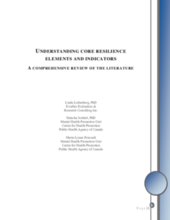Executive Summary
Promoting the mental health of Canadians and strengthening public health capacity for mental health surveillance are key components of the Public Health Agency of Canada’s (PHAC) mandate and priorities. The promotion of population mental health focusses on fostering individual mental health through the development of resilience and resourcefulness (i.e. individual assets) and creating supportive and resourceful environments, communities, and life settings (i.e. relational/contextual resources). This report seeks to expand the understanding of core resilience elements and indicators in order to improve Canada’s capacity to promote the mental health of Canadians across the life span.
Existing knowledge on individual resilience is mostly issue-based (e.g. child abuse and maltreatment, violence, behavior problems, mental illness, trauma, etc.), disparate and focused on adversity and external factors and resources (i.e. psychological support, social support networks, child welfare systems, etc.). For this reason, this report explores the concept and measurement of resilience from an “inside-out”, developmental (life course) and population mental health promotion perspective, through a critical review of the literature. Its core aim is to refine our understanding of key, consensual elements and indicators that promote resilience. Guiding the report is the following working definition, developed by the authors of this report based on previous research on resilience and mental health promotion, including an initial exploratory review:
“As a developmental process, resilience primarily involves the agency, or inner capability of individuals of all ages, to call on their internal strengths, engage with others and look for external resources to successfully transform stressful situations or adversity into opportunities to learn and thrive.”
The objectives of this work include the following:
1. To describe the current thinking and state of understanding on individual resilience throughout the life course (i.e. in infants, children, youth, adults and older adults);
2. To identify common, consensual elements within the diversity of existing definitions and measurements;
3. To conduct an in-depth analysis of this literature review to further our understanding of and thinking around a) the concept of resilience and b) the measurement of resilience, to develop a basic set of resilience indicators across the life course; and,
4. To discuss the implications of these findings for further work, most notably mental health and resilience surveillance as well as mental health promotion policy and programs.


